Saving West Africa’s Last Rainforest
Air Date: Week of May 24, 2019
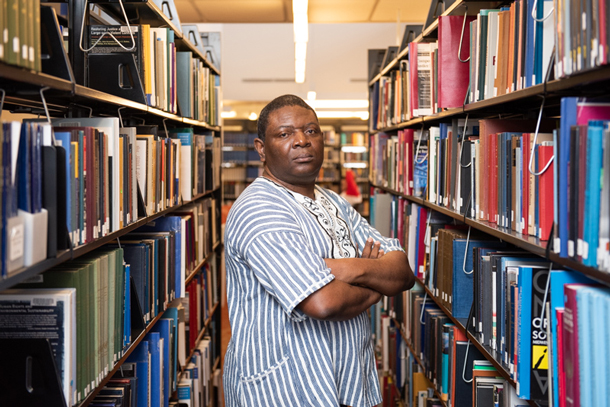
Lawyer Alfred Brownell fought and won against Golden Veroleum Liberia’s attempts to take over indigenous land and wreck West Africa’s largest remaining tropical rainforest without due process. (Photo: Goldman Environmental Prize)
When an oil palm development in the poor West African country of Liberia uprooted indigenous communities, destroying their religious shrines and burial grounds, and moved to cut down the last major swath of tropical rainforest in the region, lawyer Alfred Brownell jumped into action. He and his colleagues were able to persuade the Roundtable on Sustainable Palm Oil to get the company to back off, but not without great personal risk. Attorney Brownell, who has been recognized with a 2019 Goldman Environmental Prize, tells Host Steve Curwood why the remaining Liberian tropical rainforest is so important to protect, as a vital natural resource and as the home of indigenous people.
Transcript
CURWOOD: The winners of the Goldman Environmental Prize each year are nothing if not courageous. Many risk their lives to protect endangered species, rare natural resources, and indigenous land rights. Lawyer and human rights advocate Alfred Brownell of Liberia is the 2019 Africa recipient for his work to save over 800,000 acres of Liberia’s Upper Guinean rainforest from development into massive palm oil plantations. This rain forest and carbon sink is the largest in the region and nicknamed the “lungs of West and North Africa”. It’s a biodiversity hotspot and home to many indigenous people. Attorney Brownell’s conservation efforts nearly cost him his life as he battled Liberian government officials and the palm oil company, Golden Veroleum Liberia. And after he found a way to block the financing of the project he was forced to flee with his family to the United States, where he is now serving as a Distinguished Scholar at Northeastern University’s School of Law in Boston. Alfred Brownell joins me now in Living on Earth’s studios. Welcome.
BROWNELL: Thank You, it’s a pleasure to be here.
CURWOOD: You’ve risked your life to protect this forest, please tell us why you were willing to risk everything to guard it against the palm oil plantation folks?
BROWNELL: What more of an honor it is to fight for this planet, to fight for this forest, to fight for a way of life of people who are preserving it? It's a life worth giving. If no one is prepared to lay their life down, to fight to preserve Mother Nature, to protect this planet, to ensure that generations unborn will come and have a safe and healthy environment, and clean water and soil that is not poisoned by agrochemicals, and species in nature that are protected, that allow for generations unborn to perpetually and continually serve. If you're not able to give your life for that, then what cause you are able to stand up for? So I think I was always prepared to give that life, and even now I'm prepared to do that. The sort of threat we now face because of the way our forests and landscape are being destroyed, that is now warming of our planet, that is now creating the sort of challenges that the world now face -- drought, flood, forest fires, mass migration, poverty, and conflict. If the world and the planet is not worth the battle, if you are not able to stand up and allow yourself to be counted, and put your life on the line to fight for that, what else are you prepared to give your life up for? What is the meaning of your life? What is the meaning of your purpose on this planet?
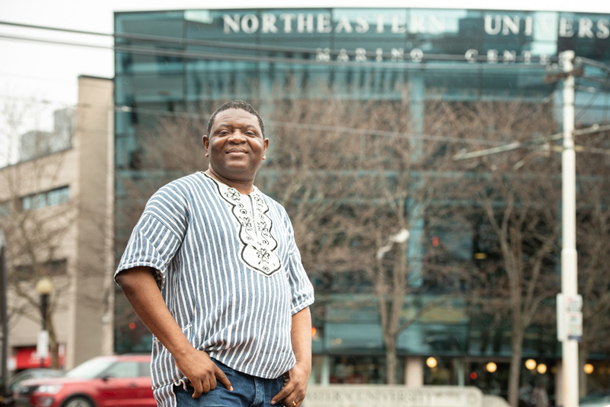
Now living in exile in the United States, Brownell teaches at Northeastern University in Boston, Massachusetts. (Photo: Goldman Environmental Prize)
CURWOOD: Locally, in Liberia, why is the conservation of the Upper Guinean forest essential to the preservation of the local people who are there, the indigenous folks who are there, and their culture?
BROWNELL: If you flew over Liberia, all you see is the vast expanse of forests. It's like you are flying over an ocean of trees, green in color. It's actually one of the wonders of the world, to just see a continuous span of trees going over. And all that one will feel and think is that, these are just trees. And below them these are just animals. But a forest is also your home, to indigenous people. It represent their history, their culture, their tradition, their way of life. They refer to the forest as their supermarket, this is where they go and get the food. They refer to the forest as their pharmacy, this is where they go and have its medicinal plants. They refer to the forest as their university, this is where they teach the young people about the way of the tribes and the culture; how to become farmers -- and sustainable farmers; how to develop indigenous business enterprises. So over the years, they've learned how to coexist their life with nature, in a very sustainable way. That's why this forest is important. But much more than that, this is the last refuge of what west Africa once used to look like. If you went back in the times in West Africa, it was completed green across the entire region. Completely green, it was completely blanketed in green forests. The only portion of that blanket of forest in that entire region is what we now have in Liberia. It's the only intact forest. In other countries, they are all fragmented. So that's why it's important to protect this forest. It's the largest carbon sink in all of North and West Africa.
CURWOOD: So when you got concerned about this in a public way, what happened when you started speaking out against the Golden Veroleum Liberia company, these are the folks that want to do palm oil plantations, and you used your training as an attorney to, to launch a legal advocacy campaign against that firm. What happened to you?
BROWNELL: [LAUGHS] Well, of course they were not happy. I mean, this is a multi billion-dollar investment that has come. And the Government of Liberia had signed away massive amount of land. Think about that, 350,000 hectares of forest. That's as almost like, almost 800,000 acres of land, to this company. The government had not consulted the communities; the government had not even gone to do any kind of mapping of the land area. You know, it's how, you know sometimes elites in many other countries, you know, don't have respect for locals who have lived on this land, and just give this land to this company. And they went ahead and you know, said well, we have authority from the government and we want to take the land. And started to evict folks and clear away the land. And so my attention was drawn to what was happening. And I went and I saw what has happened; I was shocked, because I have seen entire towns and villages, completely bulldozed, by these companies. I have seen stream and creeks poisoned. I've seen people shrines, religious sites, their gods -- desecrated. I have seen people's burial grounds of their great warriors, their tribal chiefs, those who establish their towns and villages -- and like in the US it's talking about someone going in and desecrating the graves of -- what's the first president?
CURWOOD: George Washington.
BROWNELL: George Washington. And I'm wondering what Americans will say about that. Or it's like, to the African American, someone going and trying to desecrate the grave of Martin Luther King. What would they say about that? This is what these companies were doing to those people. Their entire history, their value, their way of life, their culture, their very essence, what made them indigenous people, was under threat and attacked by these palm companies.
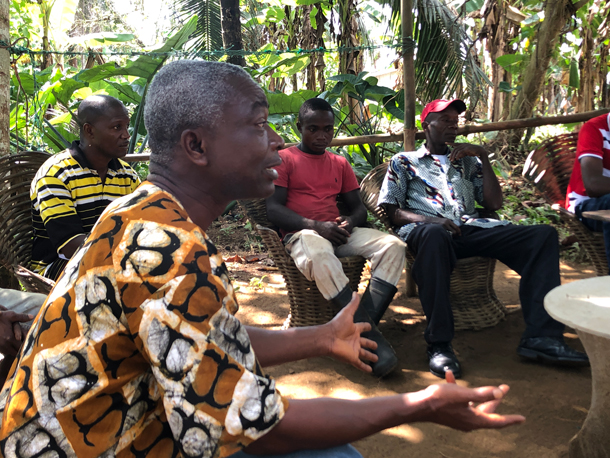
Liberians discussing the threats oil palm developments are bringing to their land and indigenous communities. (Photo: Goldman Environmental Prize)
CURWOOD: So what did you do?
BROWNELL: So I had to act. So the first thing we did was, well, we felt, maybe this has been done out of ignorance, maybe there wasn't an awareness, the government didn't know about this. So at the local level in the region, we informed the local authorities, government officials; we moved into the cities; we went from ministries and agencies of the government to complain; organized massive press conferences, to draw attention. No one cared. They were in deal with the companies and was taking on destruction.
CURWOOD: So we're talking about the motivation of money here.
BROWNELL: Absolutely. This was not a venture that was intended to fail, it was too big to fail. This was intended to transform Liberia into a desert of oil palm. So we had to find a way to organize. The plan was to challenge just the grant of the rights, on the basis that the government of Liberia had no authority to give the lease rights to a transnational corporation, on land that indigenous people have existed on and occupied, even before the existence of Liberia.
CURWOOD: But how do you stop that? I mean, if the government is going to rule on any complaint that you bring forward, they're in charge of this process.
BROWNELL: Absolutely. Given how the government was involved in this process, and given that they ignored all of the pleas that we made, we felt that if we had gone to court, we probably wouldn't have prevailed.
CURWOOD: So what's the answer?
BROWNELL: And then a friend of mine said, Well, you know, Golden Veroleum is a member of an international consortium called the Roundtable on Sustainable Palm Oil, which is a certification body to ensure that palm companies were engaged in the sustainable production and marketing of oil palm.
CURWOOD: So your strategy is, this palm oil company needs to certify their palm oil as sustainable, because there are great concerns about this from Indonesia to West Africa. And so you went to this certification agency to tell them, uh-uh, this ain't sustainable.
BROWNELL: But certification is not just about a label that would give to them, you have to understand what the label means to the companies that are involved in the production.
CURWOOD: Okay, what does it mean?
BROWNELL: Because, given what has happened in Southeast Asia, given the alarming nature of how palm oil companies are operated in Indonesia and Malaysia, and the impact on the forest, and the species and orangutans -- it's creating alarm, it's creating concern, among activists, environmentalists, and social activists, and among consumers, and they demand for more sustainability. So it meant that many palm companies were not even having the financing to engage in production and to engage in the marketing. So they needed this label, to show to the banks, to investors, to shareholders, to their suppliers, to the consumers, that indeed they can get the financing to do this. And so we filed a complaint. We actually said, "We are open to an independent assessment and verification of the allegations we made." And they took the bait.
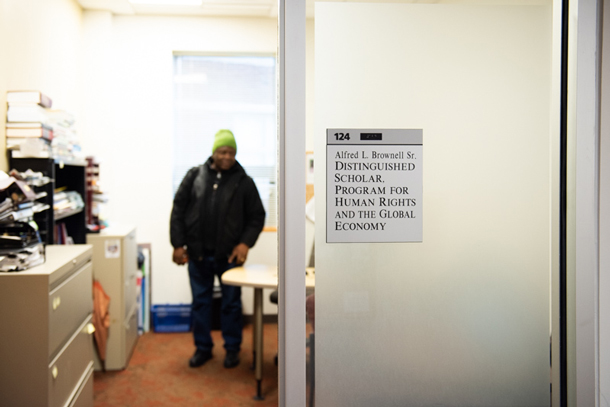
Alfred Brownell’s position at Northeastern University has given him a new platform and resources with which to fight oil palm developers’ attempts to take indigenous lands. (Photo: Goldman Environmental Prize)
CURWOOD: Ooh.
BROWNELL: Yes.
CURWOOD: So they came and investigated.
BROWNELL: Of course.
CURWOOD: And they found?
BROWNELL: And they found that we were right, every single bit. This is very important for our audience to understand what this is, because sometimes many folks will pitch this as development. How come poor villagers, living in misery and poverty, will have concerns about a multi-billion-dollar investment coming to their community, why are they opposing that? Don't they want a better way of life? But what many people don't understand is how this occurred on the ground. So imagine Golden Veroleum, for example -- a multi-billion dollar, the second-largest palm person in the world, going to poor villages. These villages, before the palm came, had their own palm. They had indigenous palm, they had their food crops, and the company wanted that. So the women, for example, had planted oranges, that they would sell every year, between the harvests. An orange tree will produce anywhere from between 8 to 12 bag of oranges. A bag of orange will sell for 10 U.S. dollars. So if a lady was able to harvest a tree of oranges, and had 12 bags, it meant that she had 120 U.S. dollars in her pocket. She would have that to support she and her family and her kids. The oil palm companies came and they didn't want that. They took away that tree, and guess how much they paid this woman.
CURWOOD: Nothing?
BROWNELL: 20 U.S. dollar per tree. Per tree. Not even the economic or market value. So what development is that, that will further impoverish people who already, out of their bootstraps, have engaged into entrepreneur activities? And so we had to act. And so, when those were established, the Roundtable on Sustainable Palm Oil wrote them and said, you have to stop further clearing, further development, and sit down and negotiate with these villagers.
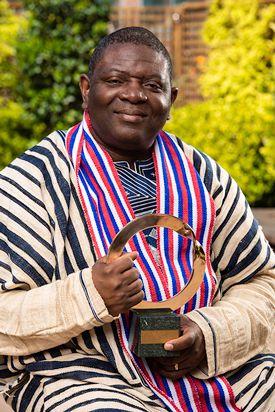
In addition to a monetary prize, Goldman Prize winners each receive a bronze Ouroboros sculpture. Common to many cultures around the world, the Ouroboros, which depicts a serpent biting its tail, is a symbol of nature’s power of renewal. (Photo: Goldman Environmental Prize)
CURWOOD: We're speaking with Attorney Alfred Brownell, Goldman Environmental Prize winner from Liberia and we'll continue with his story of protecting West Africa’s largest old growth rain forest after the break. That’s just ahead on Living on Earth.
ANNOUNCER: Funding for Living on Earth comes from you, our listeners, and United Technologies, combining passion for science with engineering to create solutions designed for sustainability in aerospace, building industries, and food refrigeration. UTC companies such as Otis, Carrier, Pratt and Whitney, and UTC Aerospace systems are helping to move the world forward. You can learn more about United Technologies by tuning into the Race to Nine Billion podcast; listen at racetoninebillion.com. This is PRI, Public Radio International.
[CUTAWAY MUSIC: King Sunny Ade, “Samba E Falaba Lewe” on JuJu Music, originally on Island Records (Now on Mango)]
CURWOOD: It’s Living on Earth, I’m Steve Curwood.
We continue our conversation now with Alfred Brownell, the Goldman Environmental Prize winner from Africa who saved West Africa’s largest rainforest from palm oil development. In the middle of the fight the palm oil company allegedly tried to have Attorney Brownell killed.
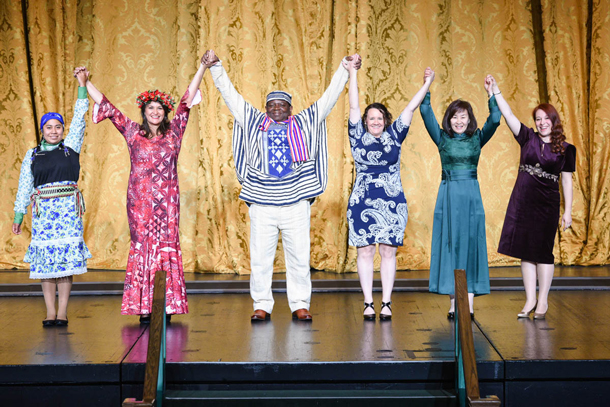
The six 2019 Goldman Environmental Prize recipients participated in a ceremony on Friday, April 26th. From left: Belén Curamil Canio of Chile (on behalf of her father, Goldman recipient Alberto Curamil); Jacqueline Evans of the Cook Islands; Alfred Brownell of Liberia; Linda Garcia of Vancouver, Washington; Bayarjargal Agvaantseren of Mongolia; and Ana Colovic Lesoska of North Macedonia. (Photo: Goldman Environmental Prize)
BROWNELL: And they try, they try to assassinate me, you know, their private securities. And this is very emotional.
CURWOOD: Tell me this story, what happened? Talk to me about the day that you understood that the assassins were coming for you What happened that day?
BROWNELL: Do you really want to hear this story?
CURWOOD: Yes, people should know.
BROWNELL: It's very personal... it's very personal. But you know, as a defender, I also know that there are many others who were not lucky like me, to be sitting down before you to tell this story. Many of my people, the communities I come from, as environmental and rights defenders, have paid the ultimate price. And bowed down and gone to see their ancestors. People like Berta and others, Ken Saro-Wiwa and others, who have died. And so in as much as this is very painful, I have actually made a commitment that I can be their voice, to keep echoing what, what this really is: the danger the defenders are facing. So as you will know, they were very angry. Now they have the stop order, and the Roundtable on Sustainable Palm Oil had instructed them to sit down and negotiate, develop a work plan and obtain the consent of communities. So they figure out that well, this certification board is based in Malaysia, Kuala Lumpur. We are in Liberia in remote villages; we can ignore what they said and continue to do this. So part of our job was to investigate their compliance with this order. So when they told them to stop, they did not stop. They continue to take the land. They build much more strong relationship with the government. They pressure the government to put more pressure on us. So that's where the threats started to come in, from the government to us. That's where we're being labeled as anti-country, anti-development, anti-investment. My very citizenship was being questioned, that I was not a patriotic Liberian. How dare I challenge an investment that will build the infrastructure and generate revenue and create employment. But we kept reporting back to the certification body that Golden Veroleum was not following their order. And so they organize the first fact-finding mission ever done by the Roundtable on Sustainable Palm Oil to a country to ensure that one of his members was actually following their instructions. So when the team came to Liberia, we took them to a place called Tarjuowon, in Sinoe County. It was in fact an area where, after the stop order was issued, Golden Veroleum had identified that it would build a mill. It was on a hill which was referred to as Palloh Hill. This was a shrine, a religious site, of the Blogbo people in Sinoe Tarjuowon, the indigenous people, who every year, would go and pray and pay homage to their ancestors. It was so revered; it was so sacred. And this was where the company decided that they would make it the site for their mills. And so the local decided to show this to the fact-finding mission. So we went in, and we proved, we actually met the earth-moving equipment that were tearing down these shrines. And when I turned around to look at these community people, some folks just dropped on the soil. People were just crying, they were just crying, they just couldn't believe that their religious site, their shrine, had been completely torn apart. So unknown to us while we're doing that inspection, assessment, Golden Veroleum and maybe some actors in the government had decided that, well, we are really going too far. And that would have been the last day I was taking my breath, and so on our way back, as we came out of the operation area, we enter a town called Sinoe Town. We came across a group of men and there was a massive roadblock, they had logs on the road. And then our cars were all surrounded by these men. And they were going around shouting, "Where's the lawyer? Where's this lawyer, we are looking for Brownell! Where's the lawyer, we are looking..." And so they were searching for me. And then one of the guys said, "Here is Brownell." And then there was a shout from the crowd, they were so happy that they found their prey. And then, you know, they started threatening and trying to open the car doors, trying to puncture the tires, knocking the glass. These men were all dressed in the company uniform, they had the coats, they had the working tools from the company. And they started dancing, "Well, today is your last day." They were happy. Then I noticed that some other folks were sharing alcohol. So folks started to drink, they started to beat drums. And then some folks stared to put chalk, the traditional war dance -- in Liberia they have to the traditional war dance that the tribes would do.
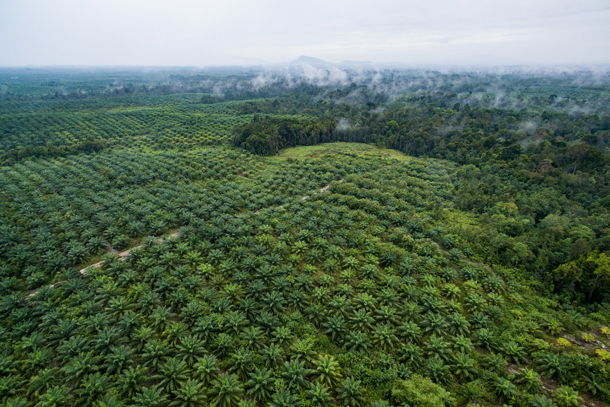
Aerial view of an oil palm monocrop and the remaining forest in Sentabai Village, West Kalimantan, Indonesia, in 2017. (Photo: Nanang Sujang / CIFOR, Flickr CC BY-NC-ND 2.0)
CURWOOD: You put chalk on your face.
BROWNELL: Chalk on your face. And some of the leaders came to the car and said, Well, you know today is going to be your end, you're never going to stop this company anymore. You know, we are going to, to eat your heart. We're going to take out your heart and eat it. And then someone say in fact, my boss is waiting for your skull. You know, he's going to turn it into a mug, he's going to drink his palm wine from your skull. And I was just being taunted, back and forth, they were dancing. And it was not easy. The colleagues who were in my car had all like given up. Some of the folks in the vehicle had already fainted. So I didn't know what to do. I just kept praying, what will happen? And I was just waiting for my time. Then they said, "Well, let's get the chief." Now this local chief was actually on the side of the company, we knew that he was one of the persons who was being paid by the company. It meant that if he gave his order, it meant that that was the end for us. So they went and they brought the chief. And he reached my vehicle and he knocked my windshield and said, "Roll down," -- I rolled down. And the chief said, "Are you Mr. Brownell?" I said, yes. He looked at me, and he said, "These people want to kill you. But I'm the chief. I don't know how that's gonna happen." And he turned around and said . . . [CRYING] he told them, he told them, "I'm not going to let you kill this man here. I'm not going to let you kill him. This blood must not waste on my land; this blood must not waste on my land. If you want to kill him take him to another town, but I am not going to allow you to kill him, and this blood will not be on my land." Then a young man who stood by him was very angry, and then he assaulted the chief and hit the chief. Then some of the young people from the village got angry that the chief had been assaulted. And there was conflict. The chief said, "Ah, so you insulted me. Then I'm going to remove the roadblock, and this car's going to go." And you know, they went and were fighting over the logs, tried to move that. And then we managed to flee the area. And we went to another village, where we stopped in a place called Buto, where we started our original campaign. And the company guys tried to chase out there and the Buto people came and said, "We're not going to allow you to touch our lawyer." We stay there for like, five days, protected by the indigenous people. Every night a movement from one house to another house in the night; people don't know who or where they would come but just like as in customs, trying to locate me. But the tribes protected me through all the time. And then they found a way to provide safety along the road back to the city. And we went, we came back to the city, we complain, we issue press statement. Couple of months later, my office strangers burglarize. I had electronic gadgets in my office, no one tried to take them away. There were DVDs, and phones, cell phones; I even had some money, some petty cash on my desk. No one took the money.
CURWOOD: What did they steal?
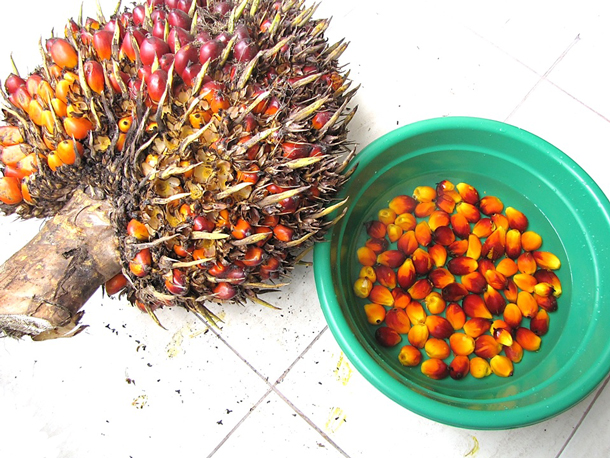
An oil palm stem, weighing about 10 kg (22 lb), with some of its fruits picked. (Photo: T.K. Naliaka, Flickr CC BY-SA 4.0)
BROWNELL: Documents, financial records. Then I started having strange vehicles following me. And then five years of bank records from my organization was taken. There were stories written to the media saying that I was corrupt, that I was using donor money to create a slush fund for myself. But I continued to persevere. And to be honest with you, I felt that it was worth the fight. It was worth the battle. And like I told you earlier on, if I faced the same attack again, I would go on. . . I'm embarrassed when I have to tell this story.
CURWOOD: Why?
BROWNELL: Because it makes me look like I'm weak.
CURWOOD: Courage is weak?...
BROWNELL: But I feel that it's important for the world to hear it. Because like I said before, I'm lucky to live, but I want the rest of the world to know what this is about. That an ingredient that you wouldn't even notice if you walk into your supermarket or grocery store, or you bought a bottle soap, or you bought chewies, or you went into McDonalds and you bought your fast food, or you went to Kentucky Fried and took your fries and your chickens. Or if you're someone who love lipstick, who buy lipsticks; or you love ice creams. You have no idea that oil palm is all over you. It's all over you. And while you are enjoying this -- both beautifying yourself and enjoying the flavor that it brings, and the happiness and joy that it brings to you and your family on this side of the world, it was raining destructions on another side of the world. So while you are beautifying yourself as a lady, there were women who were being flogged, who were being stripped naked, and chained in prison. There were the history, there was a culture, there was a religion, there were the shrines of people who have been desecrated. This is what the palm oil was doing to that country.
CURWOOD: So ultimately, of course, you felt that you had to leave. That it was just too much for your family and yourself and you came to the United States. But I imagine that the Liberian government is still trying to pursue this deal, still trying to pursue palm oil development, and other threats to the Upper Guinean forest. So now, from here in America, what kinds of legal or political strategies do you think could be used to protect the forest now from this development?
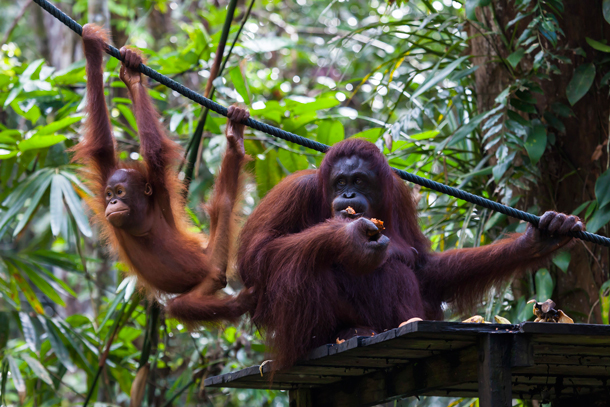
Orangutans in Borneo are quickly losing their habitat to oil palm developments. (Photo: Andrea Schieber, Flickr CC BY-NC-ND 2.0)
BROWNELL: Well, so sometimes folks believe that they are threatening you. And maybe that's how the government of Liberia and the palm companies felt, when I left Liberia they felt they had won a victory with my removing, and they can do business as usual. But I think now they realize it was the biggest mistake in their life.
CURWOOD: Because?
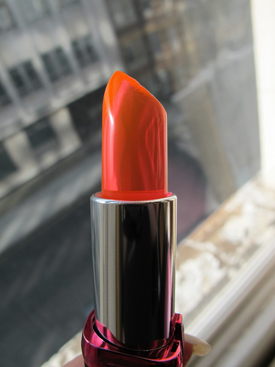
Many if not most packaged products Americans consume contain palm oil. It’s found in lipstick, soaps, detergents and ice cream. (Photo: Rain Rabbit, Flickr CC BY-NC 2.0)
BROWNELL: It was here in the US, it was here at Northeastern University School of Law. When I came and Northeastern University offered me a refuge and gave me a platform, a desk to continue my work in dignity. That's the idea -- when you go into exile, you lose everything. I left Liberia, just in one suit. The day my office was attacked by the police on the raid, I was not able to go back to my office, neither to my home. My family left in just the clothes they had on; I had to grab my kids, friends had to help me to take my wife and my kids along with me out of the country. And quickly fly me to a third country before I came to the US. But here in the US, at Northeastern, I had a platform. I had a group of students who was involved in my research, who are supporting with research. I had professors who were assisting me, I had an office, I had 24-hour electricity. I had 24-hour fast speed internet.
CURWOOD: So you can tell the story.
BROWNELL: So I could sit down and tell the story. I could sit down and continue to put pressure on the certification body. It was here that when the company launched its appeal against our complaint, that they lost. People put a lot of pressure on them. And so it was in August of 2018, a year and a half later, of sustained engagement, both supporting the communities directly in Liberia from a platform here in the US, using WhatsApp and other social media, working directly with the coalition head office that we were able to counter the appeal, and we won. And it is from here that I will continue pursuing those cases, to make sure that they are not going to take away that forest.
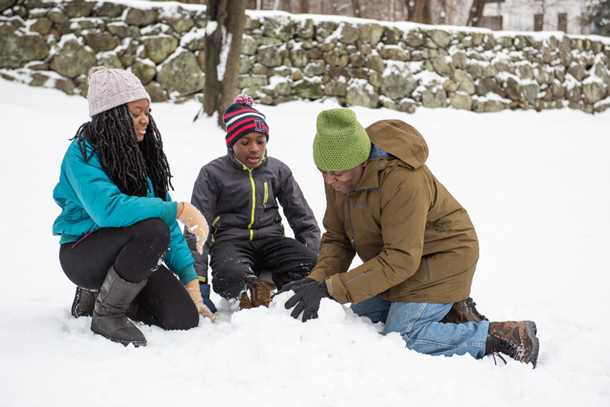
Alfred Brownell and his kids sharing a moment of fun in the snow. (Photo: Goldman Environmental Prize)
CURWOOD: Alfred Brownell is the founder and lead campaigner of Green Advocates International and this year's recipient of the African part of the Goldman Environmental Prize. Professor Brownell, congratulations. And thanks for coming by.
BROWNELL: Thank you. It's a pleasure.
Links
About Alfred Brownell, 2019 Goldman Environment Prize recipient
Watch: Alfred Brownell’s Goldman story
Listen to our conversation with co-recipient Linda Garcia
Listen to our conversation with co-recipient Jacqueline Evans
Living on Earth wants to hear from you!
Living on Earth
62 Calef Highway, Suite 212
Lee, NH 03861
Telephone: 617-287-4121
E-mail: comments@loe.org
Newsletter [Click here]
Donate to Living on Earth!
Living on Earth is an independent media program and relies entirely on contributions from listeners and institutions supporting public service. Please donate now to preserve an independent environmental voice.
NewsletterLiving on Earth offers a weekly delivery of the show's rundown to your mailbox. Sign up for our newsletter today!
 Sailors For The Sea: Be the change you want to sea.
Sailors For The Sea: Be the change you want to sea.
 The Grantham Foundation for the Protection of the Environment: Committed to protecting and improving the health of the global environment.
The Grantham Foundation for the Protection of the Environment: Committed to protecting and improving the health of the global environment.
 Contribute to Living on Earth and receive, as our gift to you, an archival print of one of Mark Seth Lender's extraordinary wildlife photographs. Follow the link to see Mark's current collection of photographs.
Contribute to Living on Earth and receive, as our gift to you, an archival print of one of Mark Seth Lender's extraordinary wildlife photographs. Follow the link to see Mark's current collection of photographs.
 Buy a signed copy of Mark Seth Lender's book Smeagull the Seagull & support Living on Earth
Buy a signed copy of Mark Seth Lender's book Smeagull the Seagull & support Living on Earth

